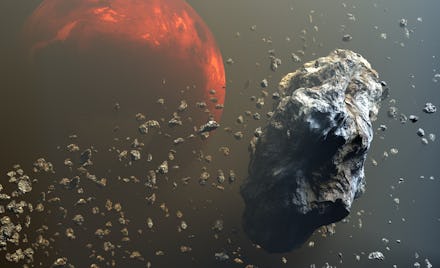NASA says this massive asteroid flying toward Earth is actually totally chill

If you think about it, asteroids are wild. They're essentially space boulders that could cause mass extinction if given enough motivation. You might be in the middle of preparing your emergency backpack after hearing one is heading our way but you don't need to worry. Even though it's massive, the asteroid currently hurtling towards Earth isn't a threat.
It's true that Earth and asteroids haven't always had the best relationship. One did turn the oceans into acid about 66 million years ago and that was after it already wiped out the dinosaurs. However, the asteroid heading our way now — called 52758 (1998 OR2) — isn't supposed to do much of anything.
As you might be able to guess by its name, the asteroid was discovered in 1998. Expected to fly by on April 29, you probably won't even notice it if you're in Eastern Standard Time. According to CNN, the asteroid will pass sometime around 4:56 a.m. ET. It won't be the biggest asteroid to pass Earth (that was Florence at a whooping 2.7 miles wide) but you shouldn't scoff at it.
The asteroid is estimated to be between 1.1 and 2.5 miles wide. To put that into perspective, the asteroid's width is about half the height of Mount Everest. At the time of discovery, 1998 OR2's size and proximity to Earth's orbit led to NASA classifying it as a potentially hazardous object, noting it is "large enough to cause global effects" if it did collide with Earth. But here's the thing: that "if" may be bigger than the asteroid itself.
NASA keeps a list of potential future Earth impact events. Called Sentry, it's "a highly automated collision monitoring system that continually scans the most current asteroid catalog for possibilities of future impact with Earth over the next 100 years." With such a long timespan, you might expect there to be hundreds of entries. Surprise, there's only twenty-three, and 1998 OR2 did not make the cut.
You could buy into theories that NASA wouldn't tell us if the asteroid was dangerous anyway. Maybe you're right. But even so, there's not much you would be able to do about an asteroid. Rather than panicking, you could read up on asteroids' cuter moments, like this "minimoon" circling the Earth, or catch up on all the shows you've been missing.